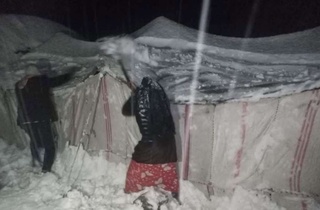Speaking by videoconference to journalists in New York, Mark Cutts said humanitarians had seen “some real horror scenes” in the last few days, especially in the northwest, where he said the camps were “bad at the best of times”.
“Our humanitarian workers have been pulling people out from under collapsed tents”, he added.
Cutts described a scenario where many people do not have shovels or other equipment to clear the snow, so they have been doing it with their bare hands, while children walk in the snow wearing just sandals.
“It's really particularly difficult for the elderly people and people with disabilities, who are living in these torn and ripped and flimsy tents in these sub-zero temperatures”, the coordinator said.
Vulnerable populations
According to him, about 100,000 people have been affected by the heavy snow and about 150,000 have been battling the rain and freezing temperatures.
“That’s a quarter of a million people who are really suffering now the effects of this cold spell that is going across the entire region”, Cutts said.
The area is home to 2.8 million displaced people, who are amongst some of the most vulnerable populations in the world.
“These are people who have been through a lot in the last few years. They have fled from one place to another, the bombs have followed them, and many of the hospitals and schools in the northwest have been destroyed during the ten years of war”, he said.
In the last few days, humanitarian workers have been doing their best to clear the roads, deploy mobile clinics, repair or replace damaged tents and provide urgently needed items, such as food, blankets, and winter clothing.
Cutts concluded issuing an appeal to the international community, asking it to recognize the scale of the crisis and to quickly get the displaced out of tents and into a safer and more dignified temporary shelter. (ILKHA)



 Güncel
Güncel
 Güncel
Güncel
 Güncel
Güncel
 Güncel
Güncel
 Güncel
Güncel
 Eğitim
Eğitim
 Dünya
Dünya
 Dünya
Dünya
 Güncel
Güncel
 Güncel
Güncel





